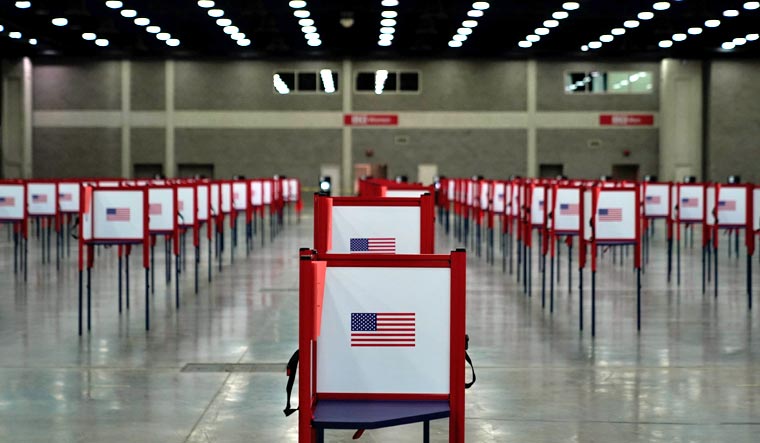Date of the American elections is just around the corner. 62 million Americans have cast early ballots. This gives hope to experts and citizens who expected a low turnout due to the coronavirus pandemic. This also is an improvement from the 58.3 million who cast their votes early in the 2016 elections-- 42 per cent of the total ballots cast.
These numbers might seem hopeful. But, 5.2 million Americans cannot cast their ballots due to their felony record. This is, however, an improvement from 2016, when 6.1 million couldn’t vote due to a felony record. A majority of people who cannot vote aren't in prison, a Vox report reads. Among the 5.2 million who cannot vote include more than 2 per cent citizens of voting age cannot vote because of either a current conviction or a prior criminal record. It also includes 6.2 per cent Black Americans who cannot vote because of a felony record.
What's caused the drop from the number in 2016 is a change in rule in some states, which have relaxed the rules and letting those in probation or parole or those whose sentences have ended to vote. In some states, however, people whose sentences have ended are not allowed to cast a vote.
For example in Alabama, formerly incarcerated people do not automatically regain their right to vote, even if they are done serving their sentence. In Alabama alone, more than 8 per cent of the voting-age population and more than 14 per cent of Black adults are disenfranchised.
In Maine and Vermont, people can vote from prison. But, in Mississippi, and Tennessee one cannot vote even if you are done serving your sentence. Racial discrepancies are reflected in the disenfranchising of individuals. As per a Vox report, more than one in ten Black American cannot vote in Alabama, Arizona, Florida, Iowa, Kentucky, Mississippi, Nebraska, South Dakota, and Virginia. The ratio is more than one in five in Tennessee.
In 2018, voters in Florida passed Amendment 4, which allowed those who finished serving their sentence to vote. But even then, about 900,000 Floridians cannot vote because of fines and court fees they have to pay to reinstate their right to vote.
On October 13, when Amy Coney Barrett was asked about voting rights of felons, she said she believes states have the freedom to deprive felons of the right to vote, but she did not explicitly state whether or not the practice is right.
This surely paints a grim picture of voting rights in the US, despite the progress made in recent years.





